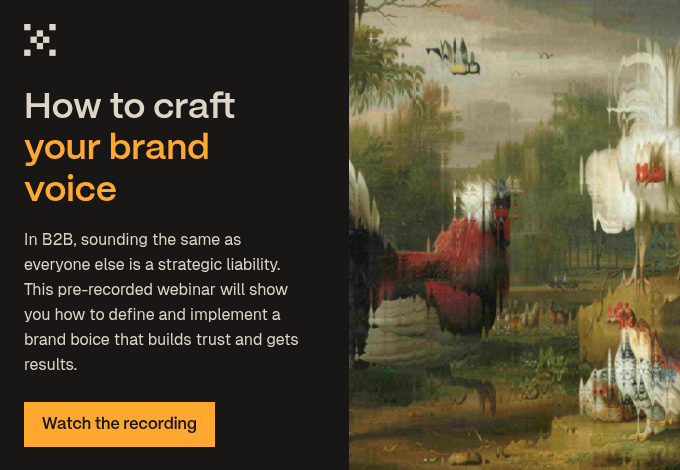It's hard to speak human when you're in tech. But it’s not impossible. Here are some copywriting examples from technology companies to show you how you can connect with your customers.
Copywriting has always been about communicating with people. But online, your customers get to choose who they listen to.
“A copywriter should have an understanding of people, an insight into them, a sympathy toward them.”- George Gribbin
According to HubSpot, people give your website around 15 seconds to make an excellent first impression. If you want to break through the noise and grab their attention, you need to make a human connection.
Many of your customers are avid searchers who know exactly what they want. If your website doesn't speak to them at a glance, they’ll up sticks and leave. But you can run this little test to see how you're doing.
Here at Articulate, our copywriters write a lot of copy for and about tech. We’ve written about speaking to your customer before which means, ahem, not talking about specs and features all the time (it’s okay, we’re nerds too). This week, we've been digging deep to find you the best examples of human-to-human copywriting in tech.
1. A warm welcome from Slack

Slack is so ingrained in office workers' daily lives that it can feel a little like a crucial member of the team. This ‘welcome back’ message on Slack’s website not only greets its visitors but adds a level of personalisation. As a technology brand, consider how elevating your welcome message with tailored or bespoke messaging can increase your relatability.
2. Lead with benefits like Mailchimp

Mailchimp produces consistently engaging and easy-to-read copy – they’ve even open-sourced their style guide. Here, they recognise that busy decision-makers don’t want to know the specific features and technical details of how the platform works. They want to know why they should use it. ‘Number one,’ ‘affordable,’ ‘easy-to-use’ — this language is music to a B2B buyer’s ears.
3. Understand their problems

Honeywell – helping this poor old chap since 1977. This is an excellent example of talking to your readers about their issues in their language, not your products in your language. We’ve said it before on our blog, and we’ll say it again: the man in the mirror is not your customer. You might need to break it down by industry, but knowing your audience is key.
4. Help them on their journey

Technology can be intimidating. Especially in the age of artificial intelligence (AI). But by its very design, it’s there to do things a bit better than humans can. This Kano ad is aimed at young adults, but you wouldn’t have guessed it. Good marketing makes people feel at ease with life-changing technology. There’s room to be a source of comfort to your audience.
5. Be bold like Nothing

Nothing, the cutting-edge tech brand founded by OnePlus’s Carl Pei, is committed to disrupting the tech market. To do this well, you must be loud and proud of your advances in technology and design. Nothing shouts out its own ‘authentic sound,’ ‘elite craftsmanship,’ and ‘best audio experience’ because it can. And you should, too. Be proud of what you’re good at.
6. Tell it like it is like Trello

Trello delivers a casual and conversational tone. As humans, we love to complain. And we love to relate to others while complaining. Lengthy emails? Annoying. Out-of-date spreadsheets? The worst. Clunky software? Dreadful. Suddenly, it doesn’t feel like Trello is trying to sell us a service. It gets us. It wants to make things better. Oh, and it makes sure you know it’s free, too.
7. Let data do the talking, like Spotify

Spotify is the luckiest brand in the whole tech sphere – they have the world’s favourite songs and guilty pleasures at their fingertips. Here, they use their listeners’ data to be humorous and informative, nodding to a pop culture reference that transcends different generations. Millennials lived it. And now Gen Z loves it. Data is a powerful tool when paired with creativity.
8. Make every word count like Monzo

Coining itself as ‘your new favourite bank’ is a genius tactic from the marketers at Monzo. And so is that distinctive shade of hot coral pink. But the brand’s use of simple, catchy rhymes, memorable alliteration, stats, and emotive language create a surefire way to capture its key demographic of 16-17-year-olds. This brand is proof that banks don’t have to be boring.
9. Hide wit in unexpected places

In times of crisis, we often turn to humour. And error pages are a great opportunity to show how you deal with a crisis(and distract your customers while you figure stuff out, of course). Delight them by referencing things they love. In this case, GitHub’s audience probably knows the Star Wars script by heart. But remember, humour will only get you so far. A reliable website matters!
10. Be inclusive, like Microsoft

Humans are complicated and diverse. For your brand to speak to humans, it must be representative. And language plays a crucial role. For example, Microsoft’s 2019 Superbowl advert featured an emotive message: when everybody plays, we all win. It was also the first brand to launch a national digital billboard campaign featuring sign language.
Write like you mean it
When it comes to writing copy, the human touch is still vital. As tech brands continue to grow and evolve, making human connections is what will help you stand out. We’ve given you some inspiration from leading tech brands. Now, let’s provide you with some tips from a writer’s perspective, too.
- Write as you speak. Write well. But that doesn’t mean you have to be formal. Use occasional colloquialisms and everyday abbreviations, such as 'don't.’
- Interview someone. In half an hour, you should get something that only they would say, which sums up the situation perfectly. This adds a genuine, human feel to your copy and can make for some great ‘shareable’ content.
- Short sentences. Conversation is rarely made up of paragraphs. It's more like a David Mamet dialogue. Short and snappy. Well, dog my cats.
- Short words. Unnecessarily long words don’t always make you sound smarter. They also sound concocted.
- Use marketing speak sparingly. Words you would not use with your family or friends have no place in people-centred writing: solution, market-leading, cutting-edge, award-winning, optional, etc.
- Don't be afraid of humour. In Gore Vidal's autobiography, Point to Point Navigation, a funny story shows Vidal at his epithetical best. At a wedding, someone said to him, "I'm always a bridesmaid but never a bride." He replied, "Always a godfather, but never a god." Humour and politics separate us from the animals. Use it. Just be funny. See also how Churchill used humour as a management tool.
- Replicate speech patterns. You don't need to write up every 'umm' and 'ah' but it's okay to throw in the odd 'yes', 'no', 'but' etc.
- Embrace the exclamation mark. Yes, I know the grammar purists will come and take away my keyboard. But if you want to sound like a real person, you could give it a try. Go for it!
- Use everyday metaphors. Ground your writing in the familiar. Technology and its capabilities aren’t easy for everyone to understand, so write about things that are.
- A sense of person, place or time. Include something biographical or descriptive that shows the author is a real person. "I'm writing this at the kitchen table..." or "When I was at university..." The master of this kind of writing was Alistair Cooke. Somehow he managed to make the serious sound informal. It's worth looking at (and listening to) some of his Letters from America.
Interested in elevating your tone of voice and injecting the ‘human touch’ into your copywriting? The Articulate team can help. **Get in touch** to find out how.
.jpg?width=1600&height=800&name=birmingham-museums-trust-ri8qLlGACc4-unsplash%20(1).jpg)





